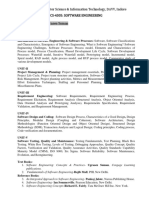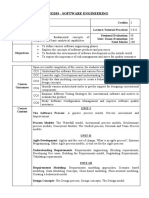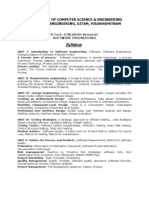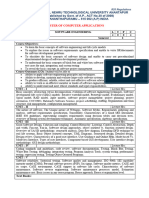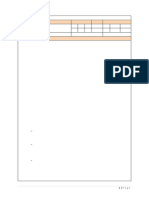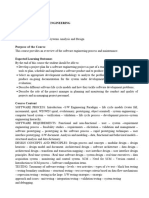Software Engineering Syllabus
Software Engineering Syllabus
Uploaded by
kanishk moreyCopyright:
Available Formats
Software Engineering Syllabus
Software Engineering Syllabus
Uploaded by
kanishk moreyOriginal Description:
Copyright
Available Formats
Share this document
Did you find this document useful?
Is this content inappropriate?
Copyright:
Available Formats
Software Engineering Syllabus
Software Engineering Syllabus
Uploaded by
kanishk moreyCopyright:
Available Formats
MADHAV INSTITUTE OF TECHNOLOGY & SCIENCE, GWALIOR
(A Govt. Aided UGC Autonomous & NAAC Accredited Institute affiliated to RGPV, Bhopal)
Department of Electrical Engineering
Software Engineering
Course Objective:
To understand the nature of software development and software life cycle process models,
agile software development, SCRUM and other agile practices.
To know basics of testing and understanding concept of software quality assurance and
software configuration management process.
Unit I- Introduction to Software Engineering: Definition, Software Engineering -Layered
Technology, Software Characteristics and Components, Software Model: Software Development of
Life Cycle Model, The Waterfall Model, Iterative Waterfall Model, Prototyping Model, Spiral
Model, RAD Model, Selection Criteria of Model: Characteristics of Requirements, Status of
Development Team, Users Participations, Type of Project and Associated Risks.
Unit II- Requirement Engineering: Definition, Requirement Engineering Activity, Types of
Requirements- Functional and Non-functional Requirement, User and System Requirements,
Requirements Elicitation Methods, Requirement Analysis Methods, Requirement Documentation
(SRS), Requirement Validation, Requirement Management.
Unit III- Design Concept, Principle and Methods: Design Fundamentals, Design Principles,
Effective Modular Design, Design Representations, Architectural Design, Procedural Design, Data
Direct design, Real Time Design, Object Orientated Design, Coupling and Cohesion.
Unit IV- Software Metrics, Project Management and Estimation: Metrics in Process and Project
Domains, Software Measurement, Software Quality Metrics, Project Management-Basics-People,
Product, Process, Project, Estimation- Software Project Estimation, Decomposition Techniques,
Function Point Estimation, Line of Code (LOC) Based estimation, Empirical Estimation, COCOMO
Model, Project Scheduling Techniques.
Unit V- Software Testing: Definition, Software Testing Life Cycle (STLC), Test Case Design,
Strategic Approach to Software Testing-Verification & Validation, Strategic Issues, Criteria for
Completion of Testing, Unit Testing, Integration Testing, Validation Testing, System Testing, Black
Box Testing Techniques, White Box Testing Techniques, Acceptance Testing.
Recommended Books:
Software Engineering, Sommerville, Pearson.
Software Engineering: A Practitioner’s Approach, Roger S. Pressman, McGraw Hill.
Software Engineering, K. K. Agrawal & Yogesh Singh, New Age Publication.
Software Engineering, Rajib Mall, PHI
Couse Outcomes:
After the completion of this course, the students would be able to:
CO1: Explain the various fundamental concept of software engineering
CO2: Understand the concepts related to software design and analysis
CO3: Compare the techniques for software project management and estimation
CO4: Design the software using modern tools and techniques
CO5: Develop and test the software through different approaches
You might also like
- OOSE Course OutlineDocument2 pagesOOSE Course OutlinemadhunathNo ratings yet
- Faculty Name: Dr. Ugrasen SumanDocument1 pageFaculty Name: Dr. Ugrasen SumanMuhammad Haider AliNo ratings yet
- Rcs402: Software Engineering Unit IDocument2 pagesRcs402: Software Engineering Unit IGod FatherNo ratings yet
- seDocument2 pagesseGod FatherNo ratings yet
- 20CS2203 - Software EngineeringDocument2 pages20CS2203 - Software Engineeringsowmitha devireddyNo ratings yet
- Madhav Institute of Technology & Science, Gwalior Deemed UniversityDocument7 pagesMadhav Institute of Technology & Science, Gwalior Deemed UniversityMihikaNo ratings yet
- Software EngineeringDocument2 pagesSoftware Engineeringvenkateshmedim0927No ratings yet
- Software EngineeringDocument4 pagesSoftware EngineeringNaveen ChigurupatiNo ratings yet
- Imca SoftwareDocument1 pageImca SoftwareAnkit KomarNo ratings yet
- Csi1007 Software-Engineering-Principles Eth 1.0 66 Csi1007 61 AcpDocument2 pagesCsi1007 Software-Engineering-Principles Eth 1.0 66 Csi1007 61 AcpNithin JoelNo ratings yet
- SE syllabusDocument2 pagesSE syllabusRekha RadhakrishnanNo ratings yet
- Department of Computer Science & Engineering College of Engineering, Gitam, VisakhapatnamDocument4 pagesDepartment of Computer Science & Engineering College of Engineering, Gitam, VisakhapatnammuralinamanaNo ratings yet
- Principles of Software EngineeringDocument2 pagesPrinciples of Software EngineeringKr UthayanNo ratings yet
- Software EngineeringDocument6 pagesSoftware EngineeringSAMAY N. JAINNo ratings yet
- SE SyllbusDocument3 pagesSE Syllbusyash.panchal.yp2804No ratings yet
- Se SyllabusDocument2 pagesSe SyllabusSubh AryanNo ratings yet
- III_IV_CS304_Software Engineering SyllabusDocument2 pagesIII_IV_CS304_Software Engineering SyllabuspriyadharshiniNo ratings yet
- Jawaharlal Nehru Technological University: Software EngineeringDocument2 pagesJawaharlal Nehru Technological University: Software EngineeringSrinivasa Rao G100% (1)
- SE - Lesson PlanDocument5 pagesSE - Lesson Planabhaymallik94No ratings yet
- Software Engg Course Handout 2024 Qver0.5-1Document5 pagesSoftware Engg Course Handout 2024 Qver0.5-1shubhuannu25No ratings yet
- software engineering syllabusDocument2 pagessoftware engineering syllabusshivamkkushwaha0No ratings yet
- Ca4C Rt11 - System Analysis & Software EngineeringDocument2 pagesCa4C Rt11 - System Analysis & Software Engineeringjobishchirayath1219No ratings yet
- Software EngineeringDocument3 pagesSoftware EngineeringImtiyaz BashaNo ratings yet
- CS31S3Document2 pagesCS31S3Preetam NayakNo ratings yet
- Silver Oak University: College of TechnologyDocument4 pagesSilver Oak University: College of TechnologyAmosNo ratings yet
- SE Syllabus (E-Next - In)Document3 pagesSE Syllabus (E-Next - In)rahulyadav7405788No ratings yet
- Integrating Metrics Within The Software Engineering ProcessDocument1 pageIntegrating Metrics Within The Software Engineering ProcessAnonymous YsVh1JJY9TNo ratings yet
- Software EngineeringDocument2 pagesSoftware EngineeringSiddharth PatelNo ratings yet
- JNTU Hyderabd Software Engineering SyllabusDocument2 pagesJNTU Hyderabd Software Engineering SyllabusKarumuri Sri Rama MurthyNo ratings yet
- Semester: IV Subject Name: Software Engineering Subject Code: 09CE0402Document8 pagesSemester: IV Subject Name: Software Engineering Subject Code: 09CE0402aNo ratings yet
- SE NotesDocument65 pagesSE Notesvvvcxzzz3754No ratings yet
- SysllabusDocument2 pagesSysllabussaijayavardhankumar1432No ratings yet
- Syllabus 1Document1 pageSyllabus 1outofworld1100No ratings yet
- Software EngineeringDocument2 pagesSoftware EngineeringRajatKumarNo ratings yet
- Software_EngineeringDocument2 pagesSoftware_EngineeringyemmanithishNo ratings yet
- CSC 2103 Software Engineering L T P C3 0 0 3 ObjectivesDocument1 pageCSC 2103 Software Engineering L T P C3 0 0 3 ObjectivesROHITH FAIZAL RNo ratings yet
- CCS 3201software EngineeringDocument2 pagesCCS 3201software EngineeringsarahNo ratings yet
- 2024 MC4102 Oose Unit 1 KVL NotesDocument22 pages2024 MC4102 Oose Unit 1 KVL Notesvijayalakshmi krishnamoorthyNo ratings yet
- B.Tech Sem 6 ITDocument52 pagesB.Tech Sem 6 ITAMAN WADHWANIYANo ratings yet
- Software Engineering SyllabusDocument2 pagesSoftware Engineering SyllabusDinesh Kumar PNo ratings yet
- 8202Document2 pages8202ZzxNo ratings yet
- COURSE Strucure - M.tech (S.E) I & II Sem (Autonomous)Document40 pagesCOURSE Strucure - M.tech (S.E) I & II Sem (Autonomous)Fresherjobs IndiaNo ratings yet
- JNTUA-B.Tech.2-2 CSE-R15-SYLLABUS PDFDocument24 pagesJNTUA-B.Tech.2-2 CSE-R15-SYLLABUS PDFbhasutkarmaheshNo ratings yet
- Software Engineering Theory SyllabusDocument3 pagesSoftware Engineering Theory SyllabusComputer Science & Engg, PusadNo ratings yet
- Software EngineeringDocument65 pagesSoftware EngineeringAYUSHI PUNDIR 20GCEBAI064No ratings yet
- 111 SemDocument5 pages111 SempraveenaprabhuNo ratings yet
- Midsem 2 - SE SyllabusDocument1 pageMidsem 2 - SE SyllabusFemil PatelNo ratings yet
- JNTUH M.Tech Software Engineering SyllabusDocument14 pagesJNTUH M.Tech Software Engineering SyllabusAhsan IqbalNo ratings yet
- Softwsre Engineering Lesson Plan For Teaching StaffDocument1 pageSoftwsre Engineering Lesson Plan For Teaching StaffRajesh KannaNo ratings yet
- KTU S6 SylabusDocument15 pagesKTU S6 Sylabusbooby112No ratings yet
- CS8494 - SE 2marks & 16 Marks PDFDocument39 pagesCS8494 - SE 2marks & 16 Marks PDFsathya priya50% (2)
- INTRODUCTION TO SOFTWARE (Mca-1)Document4 pagesINTRODUCTION TO SOFTWARE (Mca-1)manishdwivedi2002No ratings yet
- PPSyllabuspdf 2024 02 03 11 39 26Document4 pagesPPSyllabuspdf 2024 02 03 11 39 26mnatsu0432No ratings yet
- Short Syllabus: BCSE301L Software Engineering (3-0-0-3)Document3 pagesShort Syllabus: BCSE301L Software Engineering (3-0-0-3)Manav IsraniNo ratings yet
- 3.software Engineering Syllabus-1Document2 pages3.software Engineering Syllabus-1samacc0907No ratings yet
- Implementing the Stakeholder Based Goal-Question-Metric (Gqm) Measurement Model for Software ProjectsFrom EverandImplementing the Stakeholder Based Goal-Question-Metric (Gqm) Measurement Model for Software ProjectsNo ratings yet
- Mastering Software Engineering: From Basics to Expert ProficiencyFrom EverandMastering Software Engineering: From Basics to Expert ProficiencyNo ratings yet
- Essential Managed Healthcare Training for Technology Professionals (Volume 2 of 3) - Bridging The Gap Between Healthcare And Technology For Software Developers, Managers, BSA's, QA's & TA'sFrom EverandEssential Managed Healthcare Training for Technology Professionals (Volume 2 of 3) - Bridging The Gap Between Healthcare And Technology For Software Developers, Managers, BSA's, QA's & TA'sNo ratings yet

